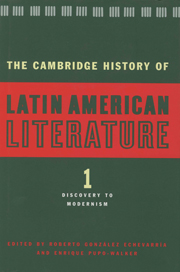Book contents
- Frontmatter
- Introduction to Volume 1
- 1 A brief history of the history of Spanish American Literature
- 2 Cultures in contact: Mesoamerica, the Andes, and the European written tradition
- 3 The first fifty years of Hispanic New World historiography: the Caribbean, Mexico, and Central America
- 4 Historians of the conquest and colonization of the New World: 1550–1620
- 5 Historians of the colonial period: 1620–1700
- 6 Colonial lyric
- 7 Epic poetry
- 8 Spanish American theatre of the colonial period
- 9 Viceregal culture
- 10 The eighteenth century: narrative forms, scholarship, and learning
- 11 Lyric poetry of the eighteenth and nineteenth centuries
- 12 Spanish American theatre of the eighteenth century
- 13 The nineteenth-century Spanish American novel
- 14 The brief narrative in Spanish America: 1835–1915
- 15 The Spanish American theatre of the nineteenth century
- 16 The essay in Spanish South America: 1800 to Modernismo
- 17 The essay of nineteenth-century Mexico, Central America, and the Caribbean
- 18 The gaucho genre
- Index
- Bibliographies
- References
17 - The essay of nineteenth-century Mexico, Central America, and the Caribbean
Published online by Cambridge University Press: 28 March 2008
- Frontmatter
- Introduction to Volume 1
- 1 A brief history of the history of Spanish American Literature
- 2 Cultures in contact: Mesoamerica, the Andes, and the European written tradition
- 3 The first fifty years of Hispanic New World historiography: the Caribbean, Mexico, and Central America
- 4 Historians of the conquest and colonization of the New World: 1550–1620
- 5 Historians of the colonial period: 1620–1700
- 6 Colonial lyric
- 7 Epic poetry
- 8 Spanish American theatre of the colonial period
- 9 Viceregal culture
- 10 The eighteenth century: narrative forms, scholarship, and learning
- 11 Lyric poetry of the eighteenth and nineteenth centuries
- 12 Spanish American theatre of the eighteenth century
- 13 The nineteenth-century Spanish American novel
- 14 The brief narrative in Spanish America: 1835–1915
- 15 The Spanish American theatre of the nineteenth century
- 16 The essay in Spanish South America: 1800 to Modernismo
- 17 The essay of nineteenth-century Mexico, Central America, and the Caribbean
- 18 The gaucho genre
- Index
- Bibliographies
- References
Summary
Given the fact that in the early decades of the nineteenth century northern Spanish America, except for Cuba and Puerto Rico, had only just proclaimed its independence it is not surprising that the many issues raised by nationhood (achieved or hoped for) should be of primary concern among the region’s essayists. Thus the essay tends to be a “serious” genre, one in constant contact with the realities of the times, with what Spanish Americans often refer to as la problemática national. While more literary essays were produced - texts in which the author gives free rein to imagination, to speculation on eternal questions, to writing in which stylistic elegance, word play, or humor take precedence over content - the works that are remembered were those that reflected the pressing issues of the period. Although some of the essayists sought original, or at least “American,” formulations of these problems, more often than not they were guided by existing European social and political thought. Thus, during the first half of the century the thinking of the Enlightenment was very much in evidence, while during the latter half various versions of Positivism and social organicism held sway.
Our survey begins with Mexico and the work of José Joaquín Fernández de Lizardi (1776-1827). Best known as the author of the long, rambling picaresque novel El Periquillo Sarniento (Mexico, 1816) [The Itching Parrot], along with other works of didactic fiction, Lizardi was also a prolific journalist and pamphleteer: his major efforts in this area were El pensador mexicano (Mexico, 1812-1814), the Alacena de frioleras (Mexico, 1815), the Conductor eléctrico (Mexico, 1820), the Conversaciones del payo y el sacristán (Mexico, 1824-1825), the Correo semanario (Mexico, 1826-1827), and a host of uncollected tracts and pamphlets.
- Type
- Chapter
- Information
- The Cambridge History of Latin American Literature , pp. 590 - 607Publisher: Cambridge University PressPrint publication year: 1996

